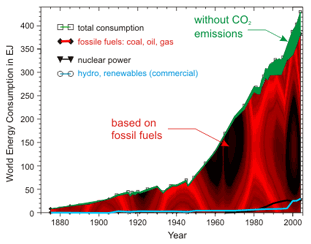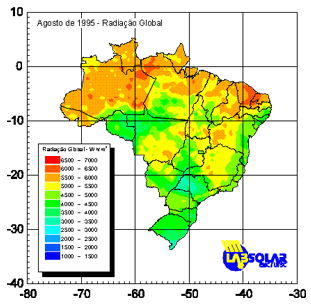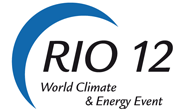Renewable Energy
The power source for the world’s future
Background: Renewable energies such as solar energy, wind power, biomass fuel and hydropower, are without question, the energy supplies for the future. The promotion of Renewable Energies to fight climate change and to conserve the resources of our planet has been on the agenda since the first UN World Summit which was held in Rio de Janeiro in 1992. The following UN Summits held in Kyoto, Johannesburg and the “Renewables 2004” summit in Bonn, brought together world leaders in the hope that they would take steps to act on a global scale. Both in Johannesburg and Bonn a strong commitment was endorsed to considerably increase the utilization of renewable energy, with the aims of reducing greenhouse gas emissions, poverty, and a dependence on fossil fuels.

Development of the world's energy consumption: Consumption from renewable sources has been surpassing that sourced from nuclear power since 2004 (Source: BP)
In recent years, growth in the renewable energy sector has been strong. Between 2004 and 2007, the global renewable energy capacity (not including Hydro power) grew by more than 185%, reaching 240GW i.e. 6% of the total global capacity generated in 2007. The renewable energy sector now surpasses the entire nuclear power supply sector and employs over one million people worldwide. In 2007 for the first time, the renewable energy sector generated more than US$100 billion in investments. Vast opportunities exist to increase the participation of renewable energies in the global energy market, especially when considering the limited reserves of fossil fuels. This will not only offset the impact of global climate change caused by greenhouse gas emissions but will also provide critically needed supply of energy to developing regions while boosting their economic development. During recent years obstacles to the renewable energy industry have been identified and should be overcome. A partial list of these includes: A lack of knowledge and vision in public and political spheres, inadequate government legislation, inefficient lobbying of governments and insufficient assessments of markets.

Huge potential for solar energy production: Daily irradiance (in Wh/m²) in Brazil during August (winter in the southern hemisphere)
RIO 12, a follow-up to the successful RIO 9, RIO 6, RIO 5, RIO 3 and RIO 02 World Climate & Energy Events is being held again in Granada, Nicaragua on January 17-19, 2012 and in Rio de Janeiro, Brazil on February 28-29, 2012.
RIO 12 brings together leading experts from science, industry and politics to report on the latest research results and present successful policies and implementations.
RIO 12 brings together leading experts from science, industry and politics to report on the latest research results and present successful policies and implementations.
The Latin American Renewable Energy Fair (LAREF 2012) will give companies and institutions the opportunity to present their latest products and services to a growing Latin American and World market.
LAREF 2012 will accompany the World Climate & Energy Event RIO 12.
LAREF 2012 will accompany the World Climate & Energy Event RIO 12.




